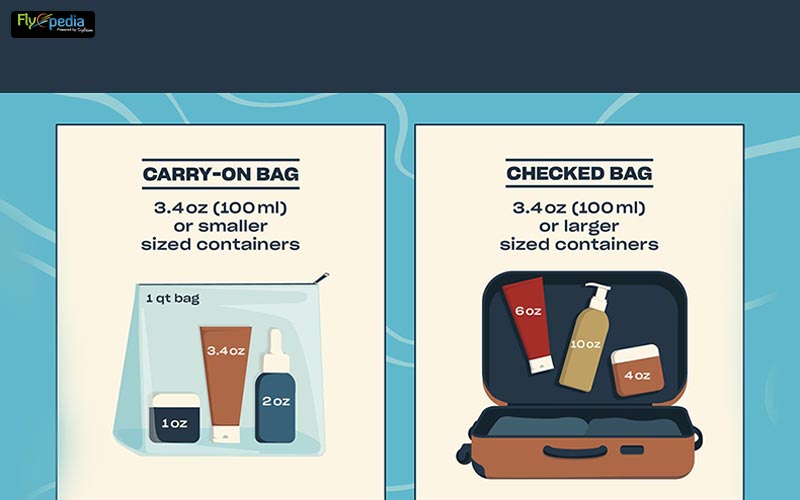What to consider liquid on a plane?
While packing a suitcase or travel bag for a journey, it is typical to be perplexed about what you are permitted to carry on board, particularly when it comes to liquids. The Canadian government has established certain essential standards about what constitutes a liquid and what travelers are permitted to Carrying Liquids In flights.
Passengers who travel rarely from Canada to India flights or haven’t gone in a long time may wonder if they’ll be able to pass through security with typical things like cosmetics, toothpaste, and contact lens solution.
While security agents dislike notifying passengers that a specific amount of liquid cannot pass through a checkpoint, it is also crucial to know the volume of liquid that is permitted.
TSA’s regulations on liquids
If you’re planning a vacation flight for international flights from India, you should be aware of the quantities and types of liquids that the Transportation Safety Administration (TSA)
While good security is essential, the TSA’s liquid quantity regulations make it more difficult to transport some essential items on planes. Today’s travelers must be careful about what they bring, especially shampoos, shaving cream, drinks, and anything resembling a fluid, as many TSA rules prohibit these items in certain quantities.
What counts as liquid according to Canadian Air Transport Security System (CATSA)
When it comes to carrying hand luggage, there are few regulations on the quantity & packaging of things. It is critical to understand which liquids you can bring in your hand luggage to ensure a smooth security experience when onboarding for your Canada to India flights. According to CATSA guidelines, properly packing your liquids, non-solid food, personal, and toiletry items, as well as understanding what is classified as “liquids, gels, and aerosols,” will result in a more efficient security screening process.
How should you pack liquids in your luggage?
Liquids in bottles with a volume of 3.4 oz (100ml/100g) or less are permitted in hand baggage only. These containers should be put in a 1L clear zip-top plastic bag. The bag’s dimensions must be between 15.24 cm and 22.86 cm (6 in. and 9 in.) or 20 cm and 17.5 cm (8 in. by 7 in). CATSA also advises passengers to avoid packing liquids, aerosols, and gels in their carry-on luggage. Some things should be placed in checked luggage instead.
The 3-1-1 Rule:
Travelers are permitted to bring most liquids, from shampoo to hand sanitizer gels, as long as they fit the requirements of the 3-1-1 regulation, according to the 3-1-1 rules. This usually means that you may bring up to six 3.4-ounce bottles of shampoo, contact solution, and other liquid requirements as long as they are all kept within a zip-top bag.
Liquids can also be transported in checked luggage (as long as they are not forbidden goods). But, if you do this, you need to make sure the liquids are packed particularly tightly so that they don’t come up while being transported beneath the airplane. The last thing you need on a work vacation is to have your shampoos or other liquids leak all over your business suit or clothes.
Bigger Volumes and Unique Liquids
During the checkpoint, travelers booking cheap flights to India from Canada can also declare bigger containers of certain liquids, such as infant formula or pharmaceuticals. Airport screeners will often let them in moderate amounts, and stated liquids don’t have to be in zip-top bags.
Medicines, infant formula and food, and breast milk are permitted in reasonable quantities of more than three ounces but must be declared for examination at the checkpoint. It’s also worth mentioning that TSA screeners will let you transport ice past the security checkpoint if it’s frozen solid. So if you bring ice, make careful to drain out any water before you pass the security checkpoint.
Exemplifications of liquids that can be in excess of the 3.4- ounce rule include:
- Baby formula, breast milk, and juice (for babies)
- Prescription and over-the-counter drugs
- Liquids or liquid nourishment for those with impairments or medical illnesses
- Specialty medical liquids, such as contact solution
- Frozen products, if solidly frozen
- Medicinal or cosmetic goods containing liquid or saline
Additional things to consider before passing through the security checkpoint
Cosmetics in carry-on baggage

1. Utilize refillable bottles
Utilizing refillable bottles or containers is frequently the easiest method to transport your beauty items. If passengers booking Canada to India flights are wanting to carry scent on the airline should pour the perfume into refillable perfume dispensers instead of bringing the complete bottle since it is likely more than 3.4 oz. If you carry your perfume in a big container, it will be seized. Body creams and pastes, for example, may be packaged into smaller containers and passed through security.
2. Seal your bottles and containers twice
To avoid spills, double-seal your bottles. Wrap the bottles in plastic bags and secure any bottle lids or pop-top apertures with tape. Take special care with cosmetics like foundation and mascara, which can easily spill.
3. Purchase items at the airport
It may appear to be a simple concept, but purchasing your toiletries and liquids at the airport is the simplest method to ensure that you are not bringing anything that does not comply with CATSA requirements. Travel-size shampoo and deodorant packets, ideal for traveling, may be offered at major airports. Always pack your liquids in travel-size containers of no more than 3.4 ounces and in a 1L-sized plastic bag. If in doubt, carry any liquid weighing more than 3.4 oz. in your checked luggage. Additionally, remember to remove your plastic bag from your carry-on and deposit it in a receptacle at the screening station.
In conclusion, carrying liquids in your luggage can be a tricky endeavor that requires careful planning and attention to airline regulations. It is essential to know the volume limits, packing requirements, and transportation restrictions to avoid any inconvenience or potential hazards. By sticking to the guidelines and taking necessary precautions, such as using leak-proof containers and packing them in a plastic bag, you can safely bring your favorite liquids on your travels. However, if you are unsure about any aspect of carrying liquids, it is always best to contact your airline for further clarification. Remember, the key is to stay informed and plan accordingly to ensure a hassle-free travel experience.
Also read: Best Techniques to Find Cheap Flights to India from Canada


